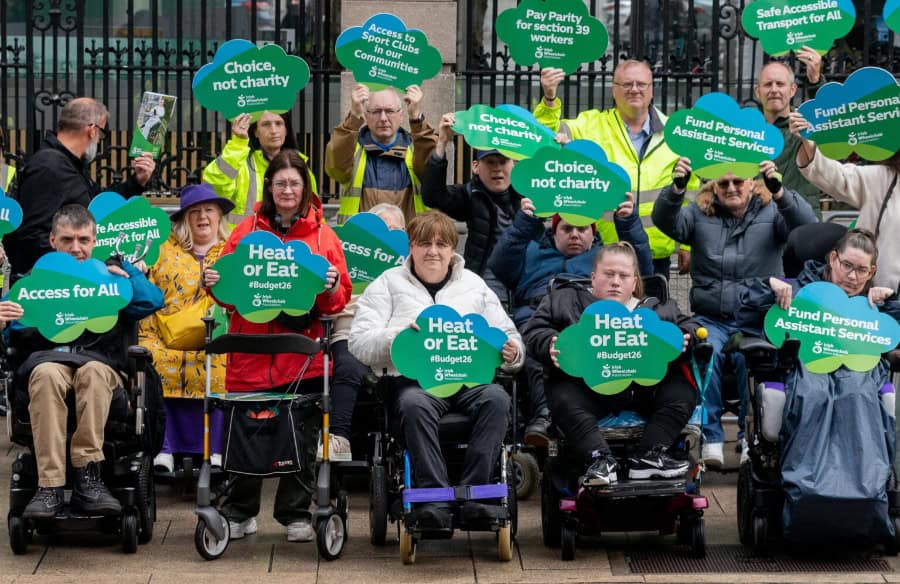
Pictured during a pre-budget submission by IWA (Irish Wheelchair Association) Calling on Government to Address the Cost of Disability in Budget 2026 outside leinster house on Kildare Street, Dublin.
Photo Gareth Chaney
Choosing between eating or heating is an impossible choice many disabled people face every winter in Ireland, says the Irish Wheelchair Association (IWA), which is calling on the Irish Government to address the cost of disability in the upcoming budget.
Members and staff of the association gathered outside Leinster House on 27 May to hand over its 2026 Pre-Budget Submission, which is urging the government to introduce a realistic Cost of Disability payment.
A steady flow of representatives from across the political divide came out to engage with members and hear first-hand the issues that are directly impacting them, including the struggle to make ends meet.
It comes as 92 percent of IWA members surveyed reported that they incur extra costs related to their disability. These span across equipment, heating, medical, and transport, as disabled people often have to rely on costly taxis to get them to and from appointments.
Other key points reported in IWA’s survey include 89 percent reported that the Housing Adaptation Grant did not cover the costs of the adaptation; 70 percent incur medical-related costs; 69 percent incur transport related costs; 66 percent incur equipment costs; and 65 percent incur additional heating-related costs.
Among those at the event was IWA member Evan Power, who shared how his heating bills reach up to €700 a month during the winter months. After paying his bills, he is left with just €30 to live on during the summer, but in the winter, he could be left with nothing.
Evan stated: “I’m very good at budgeting and manage my money well, but the truth is, once I pay my bills, I have €30 left over each week. Being in a wheelchair with limited mobility means it’s harder to stay warm as my movement is limited, so in the lead up to and during the winter months, I’m totally focused on ensuring I’ve enough money to pay my heating bill, which can go up to €700 a month.”
The submission draws from a consultation with over 700 disabled people nationwide and makes urgent recommendations, including a minimum increase of €78 in the weekly Disability Allowance, from €244 to €322; a Cost of Disability Payment to reflect the extra living costs incurred by people with disabilities; and pay parity for Section 39 workers, who deliver vital disability services.
IWA is also calling for investment in personal assistant services, accessible housing, and transport, and resources to fully implement the National Disability Strategy Plan, once issued.
With a new Programme for Government and a National Disability Strategy due to be launched, according to the IWA, Budget 2026 is an opportunity for a meaningful move towards equality and true inclusion.
Joan Carthy, National Advocacy Manager at IWA, said: “People with disabilities want to contribute, belong and live independently—but the cost of doing so is being ignored. Some members have told to us that they are having to choose between heating their homes or eating.
“Over half of our members state they do not have enough Personal Assistant hours. While progress has been made with the WRC’s recent pay awards, until full pay parity and a strong workforce plan is in place, organisations like IWA will struggle to have enough people to deliver these and other services for people with disabilities.
“The low pay review as part of the WRC agreement is an opportunity that needs to be taken seriously if a future sustainable workforce is to become a reality. It has been recognised that there are long-standing sector-wide funding issues.
“Currently, there is no clear pathway for resolution, which is essential for the future sustainability of the sector, this then will benefit the people we serve and enhance independent living opportunities for people with disabilities across Ireland.
“We have had good engagement with the Minister for Disability and the Department, but this is the Government’s chance to take action through funding and strategic planning for the future of people with disabilities in Ireland.”
The Wheelchair Alliance in England is urging the UK Government to act on an update to current guidance that would require disabled children to have driving licences and insurance for their powered wheelchairs.
The post Irish Government called on to introduce a realistic Cost of Disability payment appeared first on AT Today – Assistive Technology.
